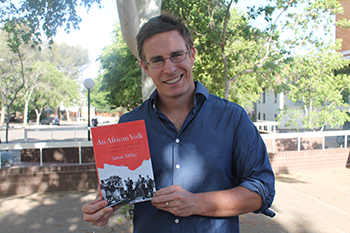Latest News Archive
Please select Category, Year, and then Month to display items
19 November 2018
|
Story Valentino Ndaba
|
Photo Xolisa Mnukwa
 “I’m an embodiment of the dreams of those whose lives have been marked by great struggles,and I want to propel and re-write the African child’s narrative.” - Priscilla Brandt
“I’m an embodiment of the dreams of those whose lives have been marked by great struggles,and I want to propel and re-write the African child’s narrative.” - Priscilla Brandt
Priscilla Brandt, first-generation LLB graduate, saw the opportunity to upgrade her career through the Graca Machel Trust, and grabbed the bull by its horns. Brandt pitched her skills and expertise to one of the trust CEO’s who happened to be part of a GLS panel discussion which was held on the University of the Free State (UFS) Bloemfontein Campus. Shortly afterwards, the organisation contacted her with an offer for a Legal and Governance research internship.
The Graca Machel Trust is an established Pan-African organisation that focuses on child health and nutrition, education, women’s economic and financial empowerment, leadership, and good governance. The trust functions under the leadership of Graca Machel, who is one of the world’s leading advocates for the rights of women and children and has stood as a social justice and political activist for years.
Brandt said her journey started in the township streets of Galeshewe, Kimberley, and was characterised by infinite difficulties and resolute challenges. However, her circumstances in no way deterred her from standing fervently in her trust and pursuit of a full and purpose-driven life.
According to Brandt, her university career involved working at several odd jobs concurrently in order to help take care of her family and to financially maintain herself throughout her varsity years. Despite her adverse circumstances, she managed to collect a vast array of domestic and international academic achievements.
She was the first female chairperson of the Black Lawyers Association Student Chapter at the UFS, served on the UFS F1 Leadership for Change programme, and represented the university in Japan. In addition to that, she formed part of a work and study-abroad programme in America for three months. She was a delegate to the International Youth Leadership Conference in the Czech Republic and was selected by the office of the Commonwealth Secretary General for the 33Sixty Conference in Singapore. Furthermore, she was nominated by the UK Humanitarian Affairs organisation to be part of the eighth University Scholars Leadership Symposium at the United Nations in Thailand.
Her knowledge and belief in her capabilities and work ethic drives Brandt to constantly challenge herself and strive for a life and character that embodies excellence.
US author launches book at UFS on African volk
2016-10-17

Dr Jamie Miller, Postdoctoral Fellow at the
University of Pittsburgh and author of
An African Volk: The Apartheid Regime
and Its Search for Survival.
Photo: Rulanzen Martin
“I realised the importance of not just accessing the policies and political approaches of the leaders of the apartheid regime, but understanding the ideas and world views that informed them. Part of the solution to this was to learn Afrikaans.”
This is according to Dr Jamie Miller, a Postdoctoral Fellow at the University of Pittsburgh, on how he went about getting inside the mind of South Africa’s apartheid regime in order to complete his book, An African Volk: The Apartheid Regime and Its Search for Survival.
The book was launched on 11 October 2016 by the Archive for Contemporary Affairs at the University of the Free State on the Bloemfontein Campus.
Volk refers to the Afrikaner nationalist movement
The book is an ambitious new international history of 1970s apartheid South Africa. It is based on newly declassified documents and oral histories, the majority in Afrikaans, which focus on the regime’s attempts to turn the new political climate to its advantage.
The term volk refers to the Afrikaner nationalist movement, also known as Afrikanerdom. The story of Afrikaner nationalism was the medium through which the regime gained power.
Four main messages from the book
Dr Miller says there are four main messages for his readers. Firstly, the apartheid regime looked to contest and hijack new ideas and norms that formed the postcolonial world, and secondly, that we need to start thinking more seriously about the Cold War in terms of domestic politics, not just geopolitics.
Thirdly, South Africa should be integrated into histories of the global South, and lastly, we should conceptualise the apartheid regime by looking at it not just as an imperial holdover, but also by looking at what was happening in the world in the time period in question.